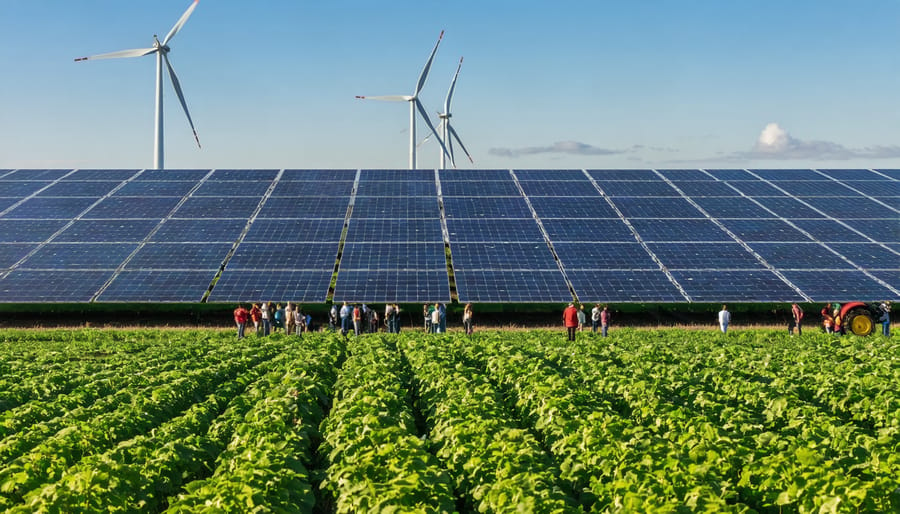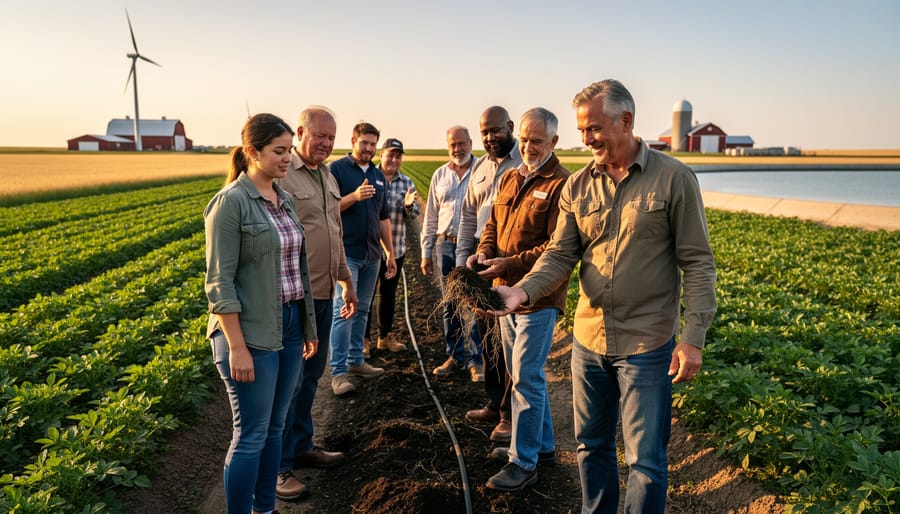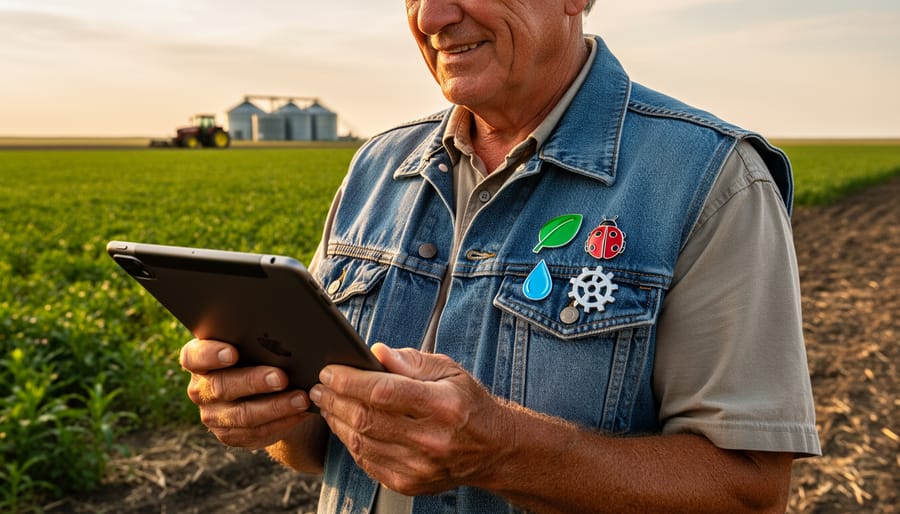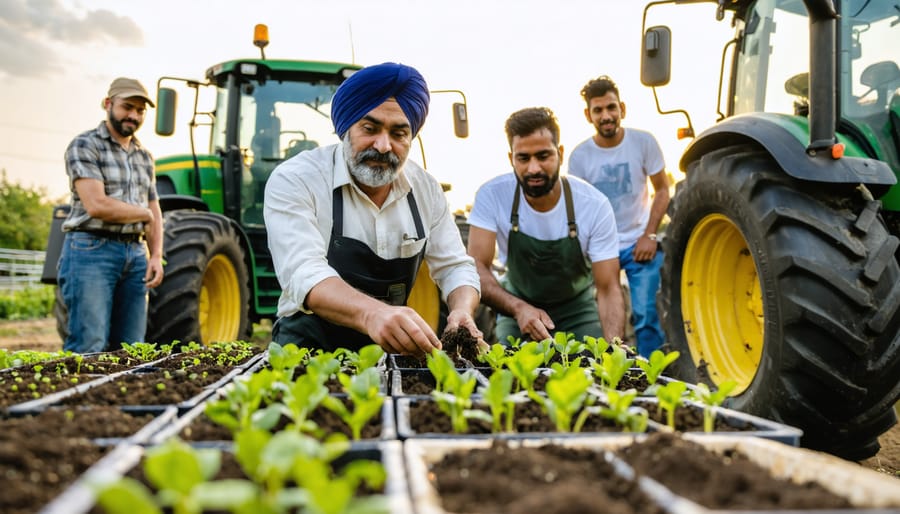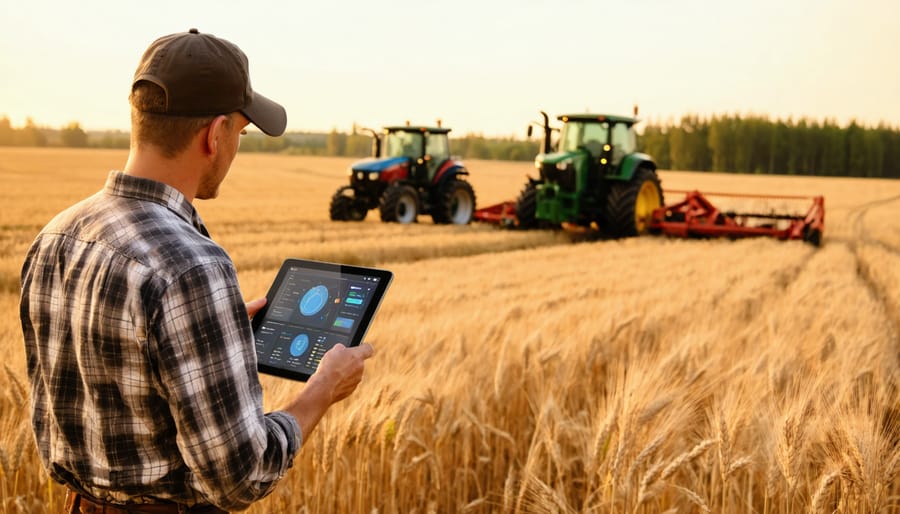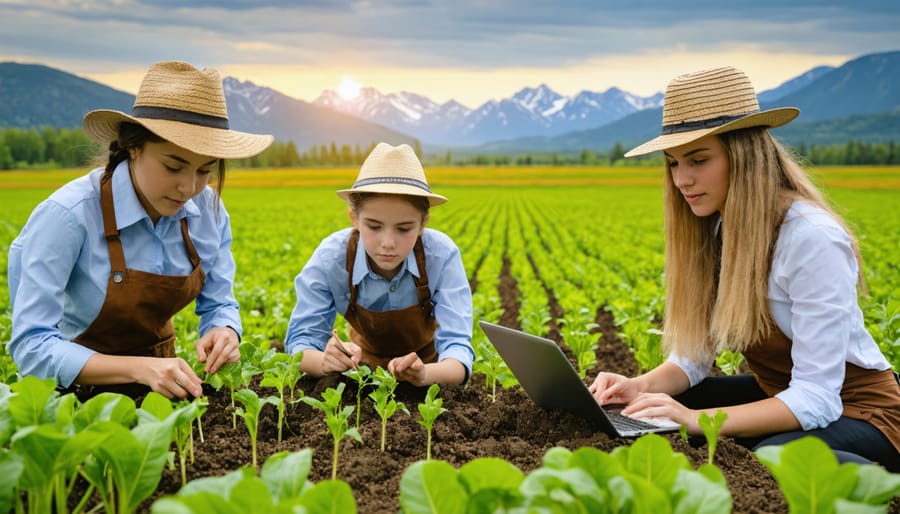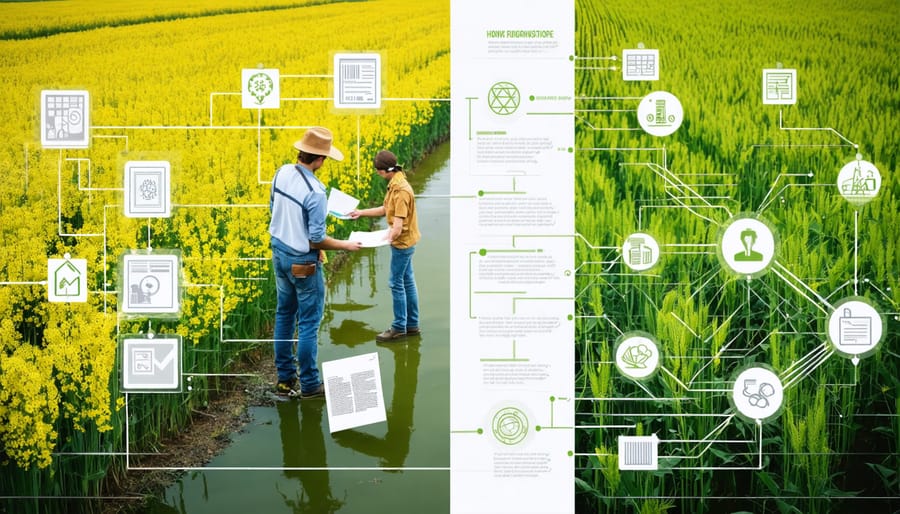Transform your agricultural operation into a dynamic learning hub by joining Canada’s growing network of farm-based education centers. As the renewable energy transformation in Alberta accelerates, innovative farmers are combining sustainable practices with educational initiatives, creating new revenue streams while nurturing the next generation of agricultural leaders.
Farm-based education networks connect agricultural producers with schools, community organizations, and environmental groups, offering hands-on learning experiences that span from soil health to renewable energy integration. These networks have demonstrated remarkable success, with participating Alberta farms reporting 30% increases in community engagement and diversified income streams through educational programming.
For producers seeking to maintain their agricultural heritage while embracing innovation, farm-based education networks offer a practical pathway to sustainability. By sharing knowledge about traditional farming methods alongside modern sustainable practices, these networks strengthen local food systems while building resilient agricultural communities across Canada’s prairies.
The Power of Farm-to-Farm Learning in Alberta
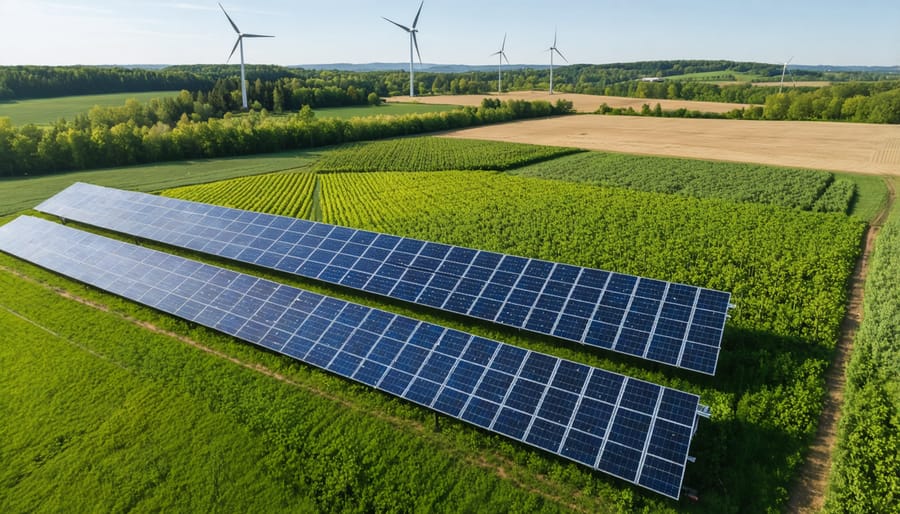
Success Stories from Alberta’s Pioneer Farms
The MacKenzie Family Farm in Red Deer County stands as a shining example of renewable energy education done right. Since 2018, their solar demonstration project has welcomed over 2,000 visitors, including school groups and fellow farmers. Their 50-kilowatt system not only powers their dairy operation but serves as a hands-on classroom for sustainable farming practices.
In Lacombe County, the Wilson Heritage Farm transformed their century-old barn into an educational hub, combining historical preservation with modern renewable technology. Their wind energy program has helped 15 neighboring farms transition to renewable systems, creating a ripple effect throughout the community.
The Prairie Rose Eco-Farm near Lethbridge demonstrates how small-scale operations can make a big impact. Their monthly workshops on solar-powered irrigation systems have equipped over 100 local farmers with practical knowledge and implementation strategies. Owner Sarah Thompson reports a 40% reduction in operational costs since installing their system in 2019.
These success stories highlight how Alberta’s farmers are leading the way in combining agricultural expertise with renewable energy education, creating sustainable models for future generations.
Building Community Knowledge Hubs
Across Alberta, farms are evolving into vibrant educational centers where communities gather to learn about renewable energy solutions. The Mackenzie Family Farm near Lethbridge stands as a prime example, hosting monthly workshops that demonstrate their solar panel system and wind turbine operations to local farmers and students. These hands-on learning environments allow visitors to see renewable technologies in action while understanding their practical applications in agricultural settings.
Many farms have partnered with local schools and colleges to create structured learning programs. The Thompson Valley Agricultural Centre, for instance, welcomes over 1,000 students annually to explore their biogas facility and learn about converting agricultural waste into clean energy. These educational hubs often feature interactive displays, working models, and real-time energy monitoring systems that help visitors understand the technical and economic aspects of renewable energy adoption.
Beyond formal education, these farms serve as gathering spaces where farmers share experiences and best practices. Regular meetups, farm tours, and workshops create opportunities for knowledge exchange and community building, helping to accelerate the adoption of renewable energy across rural Alberta. The practical, peer-to-peer learning approach has proven particularly effective in building confidence among farmers considering their own renewable energy projects.
Practical Learning Components
On-Farm Workshops and Demonstrations
Practical learning experiences form the cornerstone of our farm-based education network, where farmers gather to share knowledge and expertise through hands-on farm workshops. These sessions provide invaluable opportunities for agricultural professionals to explore innovative practices and learn from experienced peers who invest in solar power and other sustainable technologies.
Our workshops typically run for one to two days, featuring demonstrations of renewable energy systems, soil management techniques, and water conservation methods. Participants engage in practical exercises, from installing solar panels to maintaining wind turbines, gaining real-world experience they can apply to their own operations.
Recent demonstrations have included successful case studies from farms across Alberta, where participants learned about energy monitoring systems, battery storage solutions, and grid integration. These sessions are particularly valuable because they allow farmers to see systems in action and discuss challenges and solutions with those who have already implemented them.
The impact of these workshops extends beyond individual farms. Participants regularly report implementing learned techniques within six months of attendance, leading to an average 15% reduction in energy costs. Additionally, the network effect creates lasting connections between farmers, fostering ongoing collaboration and knowledge exchange throughout the growing season.
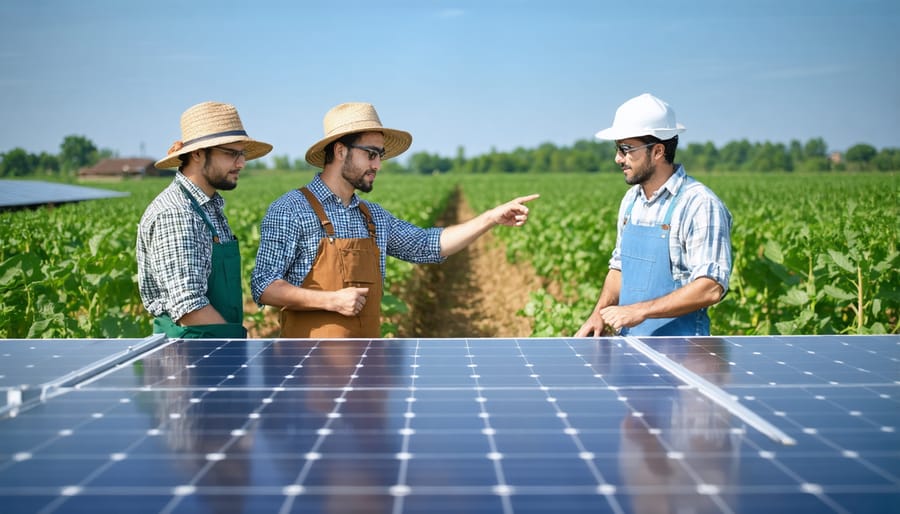
Digital Learning Resources
The farm-based education network leverages modern technology to enhance learning experiences through diverse digital learning tools and platforms. Our online learning management system hosts interactive courses, webinars, and virtual farm tours that connect participants across Alberta and beyond. Members can access a comprehensive resource library featuring instructional videos, podcasts, and downloadable guides covering everything from soil health management to sustainable farming practices.
The network’s mobile app enables farmers to participate in discussion forums, share real-time updates, and access expert advice while working in the field. Through video conferencing capabilities, experienced farmers mentor newcomers, creating valuable knowledge-sharing opportunities regardless of geographical distance. The platform’s weather integration and crop planning tools help members make informed decisions based on local conditions.
Regular online workshops feature Canadian agricultural experts who share practical insights and answer questions in real-time. Our digital community board facilitates equipment sharing, volunteer coordination, and event planning among network members. The platform also includes assessment tools that help farmers track their progress and identify areas for improvement in their educational journey.
To ensure accessibility, all digital resources are optimized for various devices and include offline access options for areas with limited internet connectivity. Regular technical support and training sessions help members maximize these digital resources effectively.
Economic Benefits of Farm-Based Energy Education
Cost Savings Through Knowledge Sharing
By participating in farm-based education networks, Alberta farmers can significantly reduce the costs associated with implementing new agricultural practices and technologies. Through shared learning experiences, farmers avoid costly trial-and-error approaches that often come with individual implementation. For example, the Davidson family farm in Red Deer saved approximately $15,000 in consulting fees by learning directly from network members who had already installed similar solar systems.
Knowledge sharing extends beyond just technical information. Network members frequently share supplier contacts, equipment recommendations, and negotiating strategies, leading to better purchasing power and reduced overhead costs. Many Alberta farmers report saving 20-30% on implementation costs through these collaborative approaches.
Regular network meetings and workshops, whether in-person or virtual, provide opportunities for farmers to pool resources for expert consultations and training sessions. Instead of each farm bearing the full cost of bringing in specialists, expenses are shared among network members. The Farmers for Sustainable Future network in central Alberta demonstrates this efficiency, where 25 member farms collectively saved over $75,000 in consultation fees last year by coordinating their learning initiatives and sharing expertise.
Grant Opportunities and Funding
Several funding opportunities are available to support farm-based education initiatives across Canada. The Canadian Agricultural Partnership (CAP) offers grants up to $50,000 for agricultural knowledge transfer projects, including educational programs and demonstration farms. In Alberta, the Environmental Stewardship and Climate Change Producer program provides funding of up to $100,000 for projects that incorporate sustainable farming education.
The Farm Credit Canada (FCC) AgriSpirit Fund annually awards between $5,000 and $25,000 to rural community projects, including educational initiatives. Additionally, provincial agricultural societies often provide smaller grants ranging from $2,500 to $10,000 for local farm education programs.
For Indigenous-led initiatives, the Indigenous Agriculture and Food Systems Initiative offers funding up to $500,000 for projects that include knowledge-sharing components. The Agricultural Clean Technology Program supports educational projects focused on sustainable farming practices with grants ranging from $50,000 to $2 million.
Remember to check application deadlines carefully, as most programs operate on annual cycles. Local agricultural extension offices can provide guidance on application processes and help identify additional funding sources specific to your region.
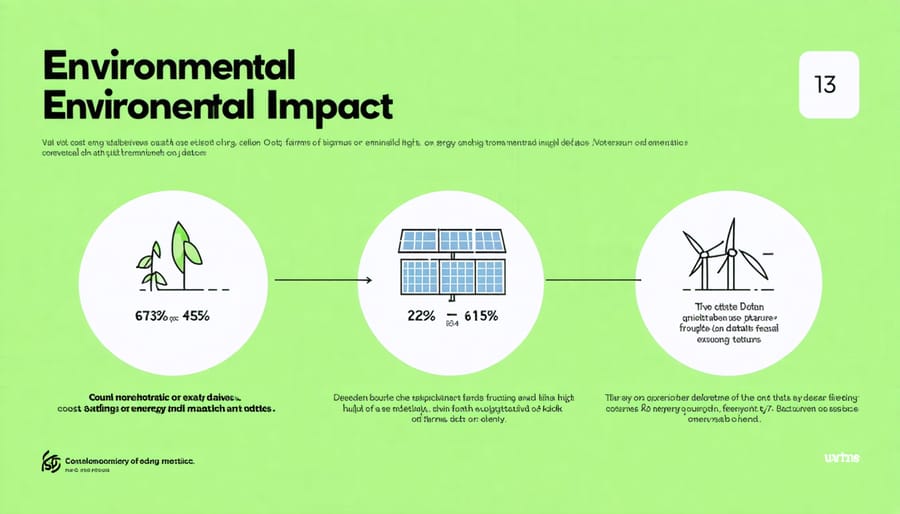
Environmental Impact and Sustainability Metrics
The implementation of farm-based education networks has yielded impressive environmental metrics across Alberta’s agricultural landscape. Recent data from participating farms shows an average reduction of 30% in carbon emissions through the adoption of renewable energy practices taught within these networks. Solar installations on participating farms have generated over 2.5 megawatts of clean energy collectively in the past year, equivalent to powering 375 average Canadian homes.
Water conservation efforts, another key focus of these educational initiatives, have resulted in a 25% decrease in irrigation water usage through smart technology adoption and improved management practices. Soil health measurements indicate a 40% increase in organic matter content on farms that have implemented regenerative agriculture techniques learned through the network.
Waste reduction programs have diverted approximately 1,200 tonnes of agricultural waste from landfills annually, with 75% being converted into compost or renewable energy through biogas systems. The network’s emphasis on biodiversity has led to the restoration of 500 hectares of natural habitat and the establishment of 150 kilometres of hedgerows, supporting native wildlife and beneficial insects.
Energy efficiency improvements, guided by network education programs, have resulted in an average 35% reduction in farm operating costs related to electricity and fuel consumption. These achievements are tracked through a comprehensive monitoring system that provides real-time data to network participants, allowing for continuous improvement and adaptation of sustainable practices.
The network’s impact extends beyond individual farms, creating a ripple effect in surrounding communities. Participating farms serve as living laboratories, demonstrating that environmental stewardship and profitable agriculture can work hand in hand while building resilient food systems for future generations.
As we look to the future of Canadian agriculture, farm-based education networks represent a powerful opportunity for knowledge sharing and community building. The potential for growth in this sector is remarkable, with projections suggesting that participating farms could see up to 30% increase in operational efficiency through collaborative learning and resource sharing.
For Alberta farmers considering joining the network, the time to act is now. Our agricultural community is stronger when we work together, sharing innovations and supporting each other’s growth. By becoming part of the farm-based education network, you’re not just investing in your own operation – you’re contributing to a sustainable future for Canadian agriculture.
The network welcomes farms of all sizes and types, from small family operations to large-scale agricultural enterprises. Whether you’re interested in hosting educational tours, participating in knowledge exchange programs, or simply learning from fellow farmers, there’s a place for you in this growing community.
Take the first step by reaching out to your local agricultural extension office or connecting with current network members. The resources and support systems are in place to help you transition into this rewarding educational partnership. Together, we can build a more resilient and knowledgeable farming community that benefits both current and future generations of Canadian farmers.
Remember, every farm has something valuable to teach and something new to learn. Join us in shaping the future of agricultural education in Canada.

